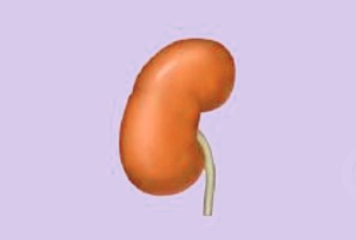Atrophic kidney is a medical term used to describe a condition of shrinkage of kidney. Atrophic tends to be extremely small in size. It can occur due to dysfunction of the kidney, kidney diseases, any damage to the kidney or its units called nephrons, or hampered blow flow to the organ.
All healthy humans have 2 kidneys located on each side of the lower abdomen, just below the rib cage. The left kidney is placed slightly higher than the right kidney. The kidneys carry out the function of eliminated waste toxic matter and end products of metabolism from the body. It also plays a role in maintaining the balance of electrolytes and the volume of fluid in the body as well as releases hormones.
Symptoms of atrophic kidney
Atrophic kidney usually occurs due to some kind of underlying illness. Hence, the signs and symptoms that accompany atrophic kidney condition are usually those caused by the pre-existing disease.
Some common signs and symptoms of atrophic kidney are listed below:
- Pain when passing urine
- Hypertension or high blood pressure
- Pain in back
- Pain in abdomen
- Vomiting and nausea
- Blood in urine
- Tiredness, fatigue
- Itchiness
- Frequent desire to pass urine
- Anemia
Causes
Atrophic kidney may be caused by varied underlying diseases or conditions that adversely affect the kidneys and/or its functions. The organ may start malfunctioning or become diseased due to impaired blood flow to the kidneys, which in turn may lead to shrinkage of different internal structures and components of the kidney system. Such shrinkage in size eventually causes the overall size of the organ to become atrophic or shrink.
Some of the common causes of atrophic kidney are listed below:
- Renal Ischemia: It is caused due to lower than normal circulation of blood to the kidneys. Deficient supply of blood to the kidneys may reduce the oxygen supply to the organ, thereby adversely affecting kidney function and causing atrophic kidney. Kidney Ischemia can occur due to atherosclerosis of renal artery. Atherosclerosis refers to constriction of the artery caused by fat buildup in its wall. Ischemia can also occur due to renal blood vessels constriction which may then cause tissue damage.
- Long term cases of kidney infections such as polycystic kidney, pyelonephritis, etc., which adversely affect the functions of the kidney system, its varied components, and/or the organ itself.
- Occlusion of renal artery, i.e., obstructions in the artery that circulate oxygenated blood to the kidneys. Such blockages may occur due to a blood clot
- Narrowing of renal blood vessels due to pre-existing renal cysts
- Reflux nephropathy
- Renal parenchyma damage which may occur due to urinary system blockages.
Treatment of atrophic kidney
Depending on severity of underlying disease, atrophy of the kidney can affect kidneys on both the sides. Doctors usually assess the current efficiency of kidney functionality before taking any call on the treatment options. If there is irreversible damage to one of the kidneys and is fully non-functional, then doctors will surgically remove the organ. However, if there is even some functionality that remains, then doctors will make every attempt to revive and restore the organ functions.
Treatment of atrophic kidney is usually dependent on the underlying causative condition. Decrease in size of kidney is generally caused by external factors that either cause damage to the kidney or its components or hamper proper blood supply to the organ. The most efficient and best treatment can be offered by physicians only after diagnosis of the precise cause. For example, kidney atrophy caused by long-term UTI or urinary tract infection is treated by antibiotics and other medications, while atrophic kidney caused by prolonged kidney disease may need dialysis.
Atrophic kidney patients also need to take care of their diet to prevent worsening of the damage to the kidneys. Any disease that affects the kidneys prevents the organs function cells from working at full capacity, which consequently increases the load on the kidneys. Eating the proper diet and some lifestyle changes will help decrease the workload on the organ and give it sufficient time to recover.
The patients’ diet may be as mentioned below:
- Balance of sodium electrolyte in the body is maintained by the kidneys. Hence, decreasing the intake of salty foods will help reduce the burden on the kidneys. Patients should avoid salty condiments and processed and canned foods.
- High-quality protein foods like fish, egg whites, and lean meats, etc., produce less metabolic waste and supplement additional vital amino acids.
- Avoid high potassium foods like dried fruits, bananas, pork, beef, and bean paste, etc.
- Refrain from consuming saturated fatty acid as it may trigger inflammatory responses and also worsen different kidney ailments
- Stop the intake of alcohol as it worsens kidney problems.
- Consult a doctor before taking any medications as drugs produce waste matter. Also check with doctor on intake of juices and water.
- Avoid purine abundant foods/drinks like beer, organ meats, pork, beef, and lamb, etc.

